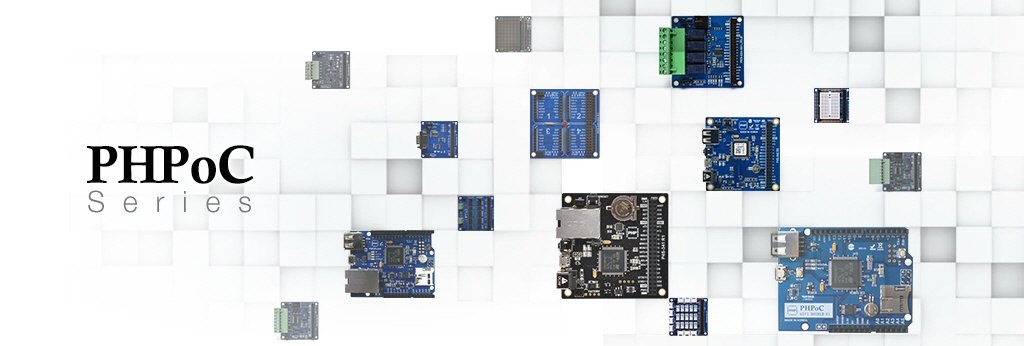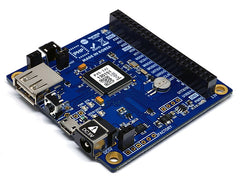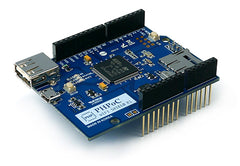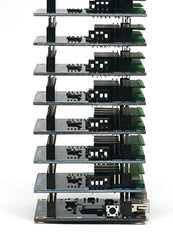
Introducing PHPoC Programmable IoT Development Boards for Dynamic Web Control
Share
We are delighted to announce that Envistia Mall is now an authorized U.S. stocking distributor for PHPoC Programmable IoT Development Boards, expansion modules and Arduino shields from Sollae Systems.
What are PHPoC Programmable IoT Development Boards?
 PHPoC (PHP on Chip) IoT development boards let you develop your IoT web application on embedded devices as easily as on your computer. With supported libraries, you can develop an IoT device, or a complex IoT system, with some simple lines of code without worrying about designing hardware.
PHPoC (PHP on Chip) IoT development boards let you develop your IoT web application on embedded devices as easily as on your computer. With supported libraries, you can develop an IoT device, or a complex IoT system, with some simple lines of code without worrying about designing hardware.
PHPoC can create a variety of web pages to suit your environment and perform other network functions such as sending email or accessing a database. Unlike PHP, however, PHPoC has additional features that an embedded system needs in order to interact with hardware. It provides a variety of hardware interfaces and functions to monitor sensor status and control machines or devices.
PHPoC IoT Programmable Development Boards are available in four versions: PHPoC Black for wired Ethernet connections, PHPoC Blue for wireless wifi connections, and both Ethernet/Wifi and wireless-only Arduino shields.
What are PHPoC Arduino Shields?
 With a PHPoC Shield for Arduino, you just need to develop the application on Arduino. With its powerful libraries and built-in web application, the Shield provides the bridge between Arduino and the internet. The PHPoC Arduino Shields are available in two models, PS-348 offers both wired Ethernet and wireless Wifi internet connectivity and the PS-347 model is 802.11b/g wireless.
With a PHPoC Shield for Arduino, you just need to develop the application on Arduino. With its powerful libraries and built-in web application, the Shield provides the bridge between Arduino and the internet. The PHPoC Arduino Shields are available in two models, PS-348 offers both wired Ethernet and wireless Wifi internet connectivity and the PS-347 model is 802.11b/g wireless.
What Are PHPoC Expansion Boards?

PHPoC Expansion boards communicate with PHPoC Blue and Black IoT Development Boards as master and slave through a smart expansion port to easily add I/O, device control, and detecting and monitoring capabilities to your PHPoC IoT system.
They can be stacked and identified by up to 14 ID numbers set by a DIP switch on the expansion board.
PHPoC expansion boards span the gamut from simple breadboard and prototyping boards to simplify the design of custom circuits to PWM and Sensor boards, relay boards to control external devices, digital and analog input boards, RS232, RS422 and RS485 communication boards, stepper motor and brushed DC motor controllers. Grove and mikroBus™ Expansion Boards simplify the connection between your PHPoC IoT Development board and mikroBus™ or Grove sensors and actuators.

PHPoC versus PHP
PHPoC (PHP on Chip) is a PHP-based scripting language developed by Sollae Systems specifically for IoT and web application development. All of their programmable products including PHPoC Black, PHPoC Blue and the PHPoC Arduino Shields have a PHPoC interpreter in their firmware. PHPoC is based on PHP, the widely used script language for server-side web development.
Similar to PHP, PHPoC can create a variety of web pages to suit your environment and perform other network functions such as sending email or accessing a database. Unlike PHP, however, PHPoC has some additional features that an embedded system needs in order to interact with hardware. It provides a variety of hardware interfaces and functions to monitor sensor status and control machines or devices.
Sollae Systems provides PHPoC Debugger, a free software program used for development and management of PHPoC Products. Learn more about PHPoC Debugger here.
For examples of PHPoC scripts, see Jasmine's PHPoC videos and PHPoC Online Examples.
Where can I learn more about PHPoC IoT Development Boards?
Download the brochure (PDF): Everything You Need to Know about PHPoC.
Visit the PHPoC Youtube channel for introductory and how-to videos.
Visit the PHPoC website phpoc.com.

